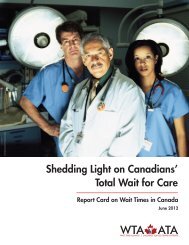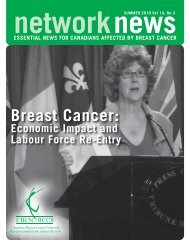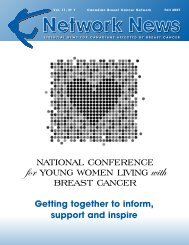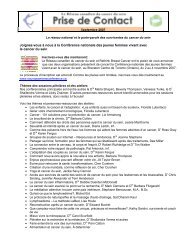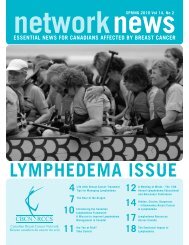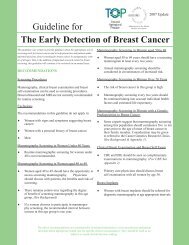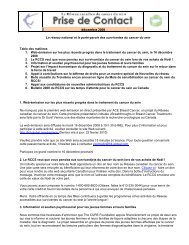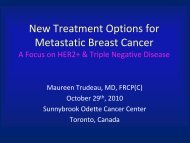Network News - Winter/Spring 2010 - Canadian Breast Cancer ...
Network News - Winter/Spring 2010 - Canadian Breast Cancer ...
Network News - Winter/Spring 2010 - Canadian Breast Cancer ...
Create successful ePaper yourself
Turn your PDF publications into a flip-book with our unique Google optimized e-Paper software.
Informing Women of the Risks and Benefits<br />
of Genetic Testing for Hereditary <strong>Breast</strong> and<br />
Ovarian <strong>Cancer</strong><br />
Interview with Susan Armel, MS, CGC Genetic Counsellor;<br />
Rochelle Demsky, MS, CGC Genetic Counsellor; Fran Turner<br />
Submitted by Ovarian <strong>Cancer</strong> Canada<br />
Genetic counsellors Susan Armel<br />
and Rochelle Demsky worry<br />
most about the patients they<br />
don’t get to see.<br />
They spend<br />
their days at<br />
the Familial<br />
<strong>Breast</strong> and<br />
Ovarian<br />
<strong>Cancer</strong> Clinic<br />
of Toronto’s<br />
Princess<br />
Margaret<br />
Hospital<br />
focused on a<br />
steady stream<br />
of patients who<br />
come to them<br />
for information<br />
and guidance<br />
about genetic<br />
testing related<br />
to inherited<br />
forms of<br />
breast and<br />
ovarian cancer.<br />
But they are<br />
concerned about the many patients at<br />
increased risk for inherited disease who<br />
are missing the opportunity to learn<br />
about genetic testing.<br />
Some patients shy away from genetic<br />
counselling because they believe that<br />
it means they must agree to genetic<br />
testing.“ That’s a big misconception,”<br />
says Armel. “People need to know<br />
that there is value in having the<br />
information and then using it to make<br />
an informed decision about testing.”<br />
Approximately 10% of ovarian<br />
cancers and 5% of breast cancers<br />
are hereditary, meaning that a<br />
predisposition to developing breast,<br />
Fran Turner, National Program Director, Ovarian<br />
<strong>Cancer</strong> Canada<br />
ovarian and other related cancers is<br />
being passed through the generations<br />
of the family. Most hereditary breast<br />
and ovarian cancers are due to<br />
mutations or<br />
changes in<br />
the BRCA1 or<br />
BRCA2 genes.<br />
These gene<br />
mutations can<br />
also increase<br />
prostate cancer<br />
among men.<br />
Both females<br />
and males have<br />
the BRCA1 and<br />
BRCA2 genes<br />
and a mutation<br />
can be inherited<br />
from a person’s<br />
mother or father.<br />
Some people<br />
who are eligible<br />
for genetic<br />
counselling<br />
miss the<br />
opportunity to<br />
consider testing because they are<br />
not being referred. “You have to be<br />
your own advocate and speak with<br />
your physician,” adds Demsky.<br />
“Anyone who is eligible for genetic<br />
testing should be referred for genetic<br />
counselling.”<br />
Most eligibility criteria for counselling<br />
and testing – whether for people already<br />
diagnosed with ovarian or breast<br />
cancer or for those without a personal<br />
diagnosis – involves having a family<br />
history of one or both of the diseases.<br />
Although the specific criteria may differ<br />
across the provinces and territories,<br />
genetic counselling and testing for<br />
gene mutations that increase the risk of<br />
inherited ovarian and breast cancer are<br />
available throughout the country.<br />
For example, Demsky states that women<br />
with invasive serous ovarian cancer<br />
or a diagnosis of breast cancer under<br />
age 35 are eligible for governmentfunded<br />
testing in Ontario and should<br />
be referred for genetic counselling. “In<br />
these cases, they don’t need to have a<br />
family history of the disease aside from<br />
their own personal diagnosis.”<br />
Fran Turner, National Director of<br />
Programs for Ovarian <strong>Cancer</strong> Canada,<br />
provides information and support<br />
to women diagnosed with ovarian<br />
cancer. She encourages those who have<br />
a family history of ovarian, breast or<br />
related cancers to find out if they are<br />
eligible for genetic counselling and<br />
testing. “If you have a family history,<br />
you should bring this to the attention<br />
of your doctor. Genetic counselling<br />
is an important next step to help you<br />
understand the risks and benefits<br />
of genetic testing. Testing involves<br />
dealing with complex information,<br />
emotions and family relationships, so<br />
having the guidance and expertise of a<br />
genetic counsellor is critical.”<br />
According to Demsky, “The important<br />
thing is for the patient to really<br />
understand what genetic testing is all<br />
about – that it’s not just a blood test<br />
but it has implications for the person<br />
and their family in terms of their own<br />
risks of getting cancer and the options<br />
available to them.”<br />
• Women who test positive for the<br />
BRCA1 mutation have a 50-85%<br />
lifetime chance of getting breast<br />
cancer and a 20-40% lifetime risk of<br />
ovarian cancer<br />
<strong>Network</strong> <strong>News</strong> <strong>Winter</strong>/<strong>Spring</strong> <strong>2010</strong> 19



